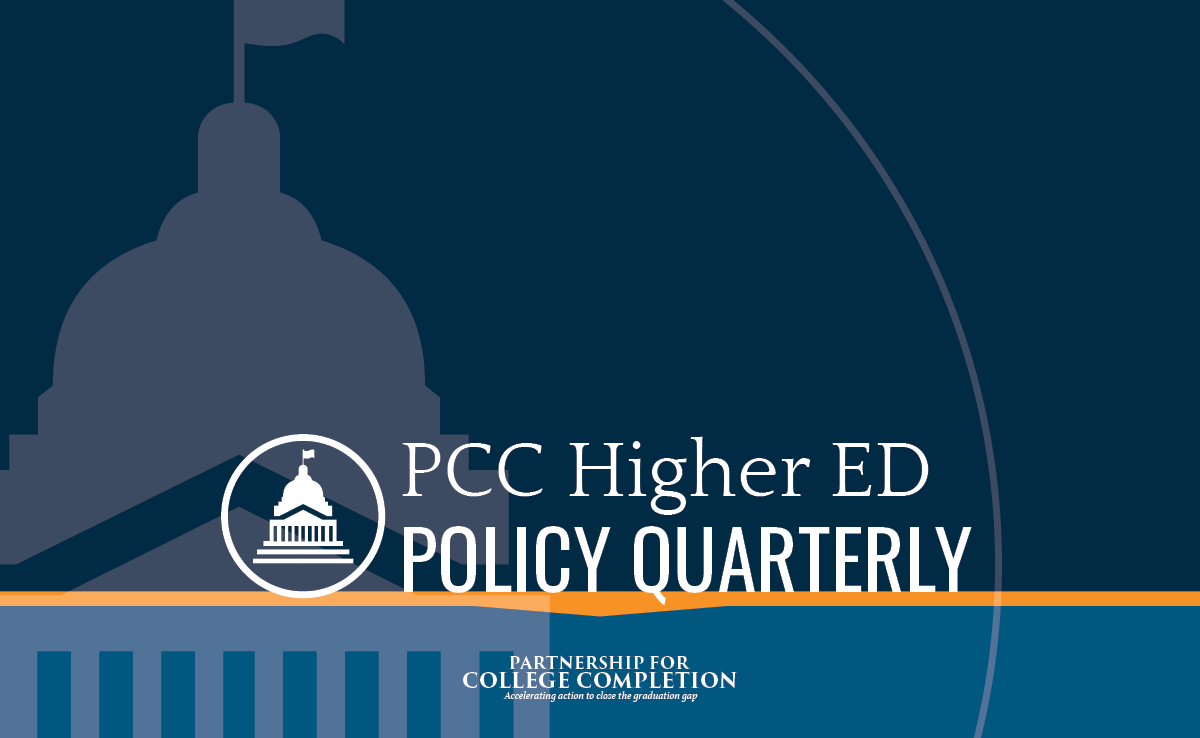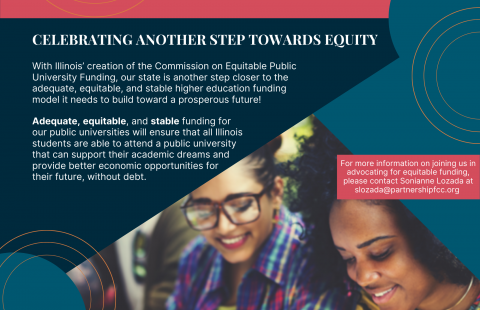
Letter from the Executive Director
When we look to solutions to address the urgency of reforming inequitable structures in higher education, we at PCC believe our two most powerful levers are policy change (state and federal) and institutional-level actions on policy and practice led by leaders at all levels within colleges and universities, all of which must be supported by data and research. Our many partners in ILEA colleges and universities, in the state legislature, state agencies, and in other nonprofit and advocacy organizations are showing what is possible when higher education takes responsibility for its student outcomes.
—Read Lisa Castillo Richmond’s full letter here.
—
Snapshot of Federal Higher Education Policy
Department of Ed Cancels Billions in Loans
The U.S. Department of Education announced that it will automatically discharge outstanding student loans for borrowers with a “total and permanent disability (TPD),” as identified through the Social Security Administration (SSA). Beginning in this month, over 323,000 borrowers are expected to benefit, which totals to around $5.8 billion in debt erased. Additionally, and related to TPD, the Department will no longer require borrowers to report their earnings, the failure of which results in reinstated loans.
On August 26 the Department of Ed announced that it will also forgive the loans of 115,000 borrowers who formerly attended ITT Technical Institute (ITT). The Education Department has approved $1.1 billion in relief, contributing to the new total of $9.5 billion discharged loans since the commencement of the Biden administration. This action discharges the loans for borrowers who attended ITT during a period in which the institution misrepresented its financial health and lured students into taking out unaffordable private loans. Students’ loans are discharged if the school’s closure prevented them from completing their degrees, or if borrowers withdrew their enrollment in the school within a few months of its closing.
Student borrower protection advocates offer praise for these moves, as hundreds of thousands of student loan borrowers have been trapped in a cycle of unnecessary debt. Read more.
—
Snapshot of Illinois Higher Education Policy
PCC Hosts First Two Meetings on Higher Ed Accountability in Illinois
The Partnership brought together a group of higher education stakeholders in July and August to kick off a series of meetings focused on improving accountability in Illinois higher education. Advocacy non-profits, national experts, and representatives from unions and state agencies weighed in on how the group might work together to improve student borrower protections, for-profit college accountability, and transparency. The group will continue to meet monthly to share knowledge and potential policy priorities for the upcoming year. If you or someone you know would like to know more about this group, please contact PCC Policy Manager Mike Abrahamson at mabrahamson@partnershipfcc.org.
Governor Pritzker of Illinois Signs Legislative Package to Advance Equity in Higher Education
On August 23, Governor Pritzker signed SB 815, a crucial first step toward equitable funding for Illinois. PCC and its partners worked with the Illinois Black Caucus and other equity-minded policymakers on the legislation, which will bring together a commission to design a fair, equitable, stable, and adequate funding model to begin reversing the damage to communities impacted by historic and systemic racism.
The Governor also signed SB 1085, HB 3359, and HB 2746 – all of which contribute to advancing equity and expanding opportunities in Illinois’ institutions of higher education. SB 1085 creates the Educational Services Consumer Protection Act, and protects students and families from predatory practices from for-profit college-planning providers by preventing them from charging enrollment or maintenance fees, for example. HB 3359 allows a student’s personal support worker (PSW) to attend classes with the student at no additional cost. HB 2746, or the Know Before You Owe Private Education Loan Act, requires lenders to obtain from institutions of higher education the cost, enrollment status, and financial assistance available to potential student borrowers, to provide students with the information necessary to make informed decisions about taking on student loan debt.
—
States Policy We’re Watching
New Mexico Higher Education Department to Review Funding Formula
The New Mexico Higher Education Department (NMHED) announced that it will establish a working group to evaluate the state’s higher education funding formula. The current outcomes-based formula considers various factors, including the number of STEM degrees awarded and the number of degrees awarded to students from at-risk populations. The working group will be facilitated by the State Higher Education Executive Officers Association (SHEEO) and is tasked to ensure that state resources directly support students and New Mexico’s current workforce needs.
California Bill Introduces a Freeze to UC Tuition
Last month, the University of California Board of Regents voted to increase tuition each year for incoming students, a tuition plan that would begin in the fall of 2022. In California, Assemblywoman Suzette Martinez Valladares introduced bill ACA 10 that freezes tuition and mandatory fees at University of California campuses until the 2027-2028 academic year. Valladares’s bill, additionally, would require increases in tuition and fees to be approved by the board before the increase is to be applied.
Massachusetts Board of Higher Education Met to Discuss Undergraduate Experience with a Racial Equity Focus
In 2018, the Board of Higher Education developed a 10-year plan focused on equity. On August 23, the Assistant Commission at the Department of Higher Education, Elena Quiroz-Livanis, provided a brief on the 2024-2034 racial equity strategic plan. They are analyzing data by race at the institution and systems levels, with the plan of launching a wide-ranging survey to students, staff, and faculty across public institutions of higher education this fall.
Wisconsin’s Urge to Create a Task Force to Examine Higher Education
The University of Wisconsin System President, Tommy Thompson, urged the Legislature to create a task force with the goal of examining higher education in Wisconsin. During an interview, Thompson spoke to WisPolitics.com President Jeff Mayers regarding the UW System, which he believes to be falling behind other states. However, Thompson failed to provide in the interview any specific goals.
—
Get to Know Illinois’ Leaders—An Interview with State Sen. Cristina Pacione-Zayas, PhD
Senator Cristina Pacione-Zayas, former Associate Vice President of Policy for the Erikson Institute, an academic institution focused on child development where she led the Institute’s efforts to create policies supporting young children, families, and communities, currently serves on the Education, Health, Higher Education, Human Rights and Revenue committees. Her experience serving in local and state government has given her an understanding of government at all levels,
In this newsletter, Senator Pacione-Zayas discusses the importance of equitable opportunities in higher education in Illinois and her goals and vision for her district and for the next legislative session. Read the full interview here.
Illinois Equity in Attainment (ILEA) Happenings
2021 ILEA Virtual Fall Summit
ILEA will be hosting its 5th summit convening November 3-5, 2021. The theme for the virtual summit is “Lifting Voices for Racial Equity with Intentional Structures.” Summit highlights include: keynote addresses by Dr. José Luis Cruz Rivera, President of Northern Arizona University (NAU) and Dr. Theodorea Regina Berry, Vice Provost of Student Learning and Academic Success and Dean, College of Undergraduate Studies at the University of Central Florida (UCF). If you are interested in joining us for this event, please contact Jonathan Lopez, Communications and Operations Manager, jlopez@partnershipfcc.org.
Equity Circles for Change
This year we are launching Equity Circles for Change (EC4C), ILEA’s version of a community of practice. We are inviting participants to share thoughts, research, data as well as insights into the ways they are breaking down systemic barriers, creating cultural change and implementing equity strategies on their campuses. This year’s topics are: Creating Equitable Outcomes at Hispanic-Serving Institutions and Diversity, Equity and Inclusion–A Look at Hiring Practices. These dialogue sessions will be co-led by ILEA Equity Program Managers and members from ILEA institutions, meet four times throughout the academic year and 1.5 hours in length. For questions about EC4C, contact Paula Hanley, Equity Program Manager, phanley@partnershipfcc.org.
Equity Academy for Presidents and Cabinets
This fall, the PCC will be inviting a second group of leaders from ILEA institutions to participate in the Equity Academy for Presidents and Cabinets (EAPC). Participants will have the opportunity to learn how to institutionalize equity practices at scale, create a shared sense of urgency, build data capacity and communicate equity targets and outcomes. The PCC will also be inviting last year’s EAPC participants to join for a second year of leadership discussions. Topics will focus on strategic finance, external communications, and assessing progress of equity goals. For more information, contact Joe Saucedo, Equity Program Manager, at jsaucedo@partnershipfcc.org.
Building Capacity in the State to Support Implementation of the Developmental Education Reform Act
Stay tuned for an exciting upcoming announcement from PCC about a significant new partnership that will launch in Illinois this fall.
—
Upcoming Events
- October 5-7, 2021
- October 19, 2021
- November 3-5, 2021
- 2021 ILEA Virtual Fall Summit: “Lifting Voices for Racial Equity with Intentional Structures” Email Jonathan Lopez. jlopez@partnershipfcc.org
- November 8-11, 2021
- November 16, 2021
- December 14, 2021
—
? Take Action ?
SHARE.
The Partnership celebrates the signing into law of SB 815 by Governor Pritzker, which will establish a commission that will focus on creating an equity-based funding model for public universities in the state of Illinois. SB 815 brings us one step closer to securing a more equitable, adequate and stable funding model for Illinois’ higher education. For more information on how you can help us advocate for equity in how Illinois funds its public universities, contact PCC Community Engagement Manager Sonianne Lozada at slozada@partnershipfcc.org.


